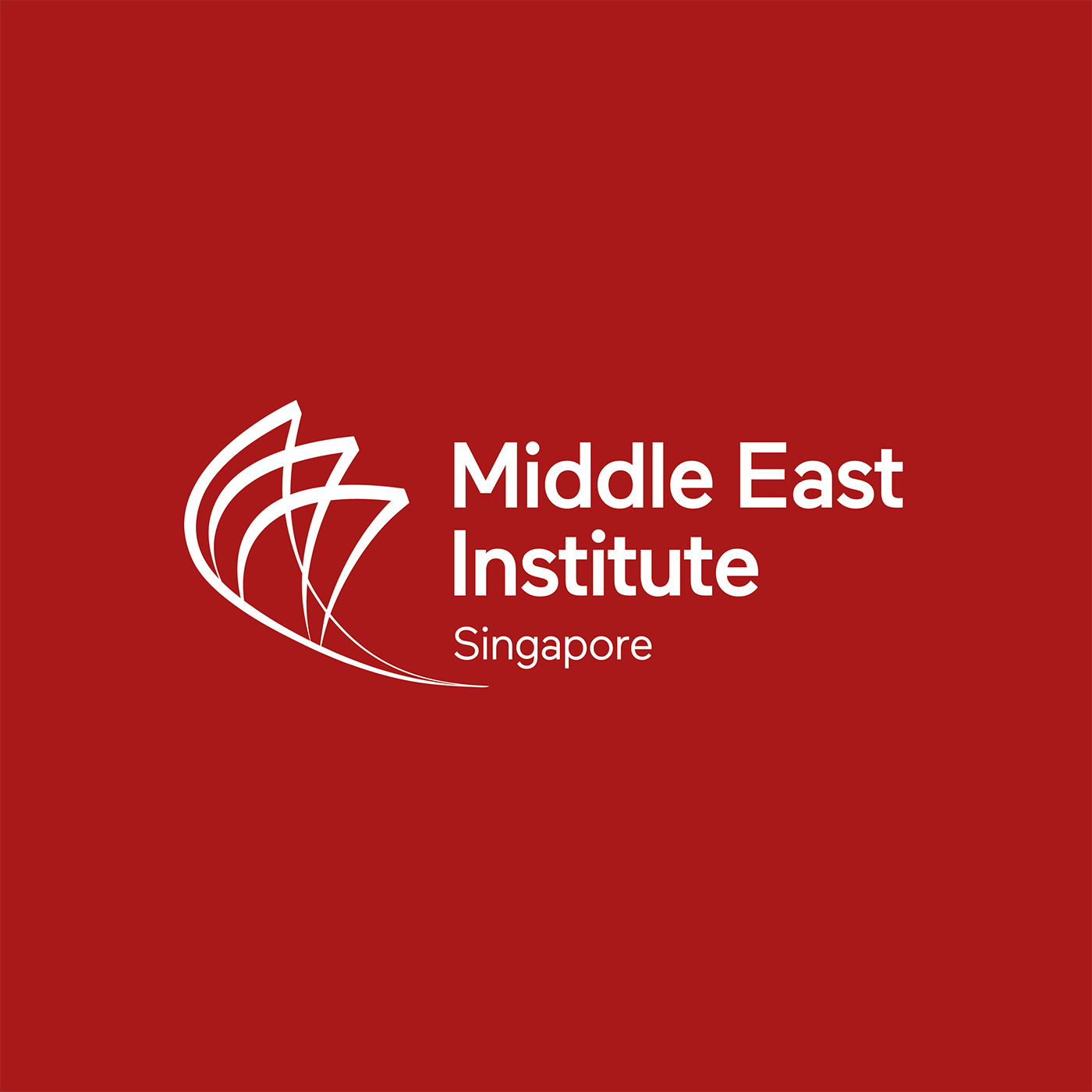Episodes
![[Book Discussion] The Middle East & The Indo-Pacific: The New Geopolitics](https://pbcdn1.podbean.com/imglogo/ep-logo/pbblog4563756/27AprOpening_300x300.png)
Friday Apr 29, 2022
[Book Discussion] The Middle East & The Indo-Pacific: The New Geopolitics
Friday Apr 29, 2022
Friday Apr 29, 2022
The Indo-Pacific region has gained prominence as the world’s major powers gravitated towards this space to expand their influence but until recently, the Middle East seemed excluded from this geopolitical shift. Things have quickly changed: in the past years, Gulf states and Israel have become the object of increased attention from Asian powers and got themselves involved in new diplomatic arrangements such as the “Middle East Quad” that may impact the competition in the Indo-Pacific. In other words, Middle Eastern states traditionally looked at the West for strategic matters but they are now increasingly defining their security agenda with an eye towards Asia.
To understand the implications of this new nexus between the Middle East and the Indo-Pacific, this webinar will discuss with the authors of a new book dedicated to the Indo-Pacific strategies and they will help us unpack the geopolitics of the Indo-Pacific and discuss the place of Middle East powers in that environment.
This public talk was conducted on Wednesday, 27 April 2022. For more information about this event, click here: https://mei.nus.edu.sg/event/the-middle-east-the-indo-pacific-the-new-geopolitics/
![[Boots Off the Ground: Security in Transition in the Middle East and Beyond] Episode 26: Omri Lavie and the Future of Cybersecurity](https://pbcdn1.podbean.com/imglogo/ep-logo/pbblog4563756/BOTG-LOGO-72-ppi-1024x576_w3ayzz_300x300.jpg)
Monday May 30, 2022
Monday May 30, 2022
In this episode, Mr Omri Lavie discusses the role of artificial intelligence in cyber operations and the future of cyber security management in a complex environment.
This podcast is presented by Alessandro Arduino, Principal Research Fellow at the Middle East Institute, National University of Singapore.
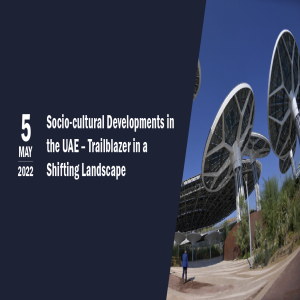
Tuesday May 31, 2022
Socio-cultural Developments in the UAE – Trailblazer in a Shifting Landscape
Tuesday May 31, 2022
Tuesday May 31, 2022
The UAE has emerged as the most iconic and widely publicised of all GCC countries in the past years. Its unique and stunning landmarks, cultural and sporting events and magnetism for talent and workforce from the wider region and beyond gave it a special position among its peers. This was further enhanced by the World Expo hosted to coincide with the country’s 50th anniversary. These were all complemented by a robust political and military role at times seen by critics as bordering on adventurism but toned down to more of a realpolitik posture as the country occupied a non-permanent seat in the United Nations Security Council this year.
The webinar examines the nature, pace and direction of the socio-cultural developments of the UAE. The objective of the webinar is to shed light on:
- the process of moving away from traditional tribal society towards nation state and what it has achieved in 50 years
- the socio-cultural aspects of the integration of an immigrant community into Emirati society outnumbering citizen population by 10:1
- the intent to formulate a moderate and inclusive contextualisation of Islam as an antidote to exclusion and extremism
- social aspects of providing adequate security in a volatile environment (human and national security)
- cultural underpinnings of building alliances that serve the continued safety, security and progress of the Emirates as a major regional center for trade, travel and culture.
The conversation also promises to contextualise the UAE’s transformation and policy initiatives with respect to its Gulf neighbours.
This public talk was conducted online via Zoom on Thursday, 5 May 2022, from 8.00 pm to 9.30 pm (SGT).
For more information about this event, click here.
![[Book Talk] Rethinking Salafism: The Transnational Networks of Salafi ‘Ulama](https://pbcdn1.podbean.com/imglogo/ep-logo/pbblog4563756/thumnail_book7ukm7_300x300.jpg)
Tuesday May 31, 2022
[Book Talk] Rethinking Salafism: The Transnational Networks of Salafi ‘Ulama
Tuesday May 31, 2022
Tuesday May 31, 2022
Despite receiving scrutiny as the one of the main ideological sources for extremist violence perpetrated by jihadi groups, Salafism is not monolithic. Looking beyond the literature discussing transnational jihadi networks, Dr Raihan Ismail examines how quietist and activist Salafi clerics work across borders to preserve and promote what they deem “authentic Islam”. In this talk, Ismail focuses on the ‘ulama of three countries – Egypt, Kuwait and Saudi Arabia – and unveil how they have taken to the cyber domain to publicise their views.
While quietist Salafis endorse an apolitical tradition and denounce political activism, haraki, or activist, Salafi clerics advocate peaceful political change. Dr Ismail reassesses existing Salafi typology, offering new categorisations of Salafi clerics in their attitudes towards sectarian matters, and when dealing with social change. Drawing upon publications, religious rulings and cyber-ethnography, her book, Rethinking Salafism, lays out how the ʿulama cooperate to foster a collective Salafi identity based on their political, theological, and jurisprudential positions.
This public talk was conducted online via Zoom on Thursday, 26 May 2022, from 5.00 pm to 6.00 pm (SGT).
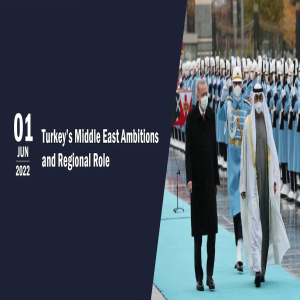
Thursday Jun 02, 2022
Turkey’s Middle East Ambitions and Regional Role
Thursday Jun 02, 2022
Thursday Jun 02, 2022
While the Middle East has perpetually been at the crossroads, the current juncture is no less critical in which regional powers are fast realigning in the wake of the US shifting away from being the most dominant player in the region. Under this scenario, Turkey’s role becomes crucial not only because of its intrinsic strength but also due to its relative standing by virtue of its NATO membership which could make it a conduit for Western powers. They can leverage on Ankara to exercise control over the Middle East geopolitics, particularly out of fear of Russia and China filling the regional security void. Against these backdrops, this webinar would delve into understanding Turkey’s Middle East ambitions and regional role.
This public talk was conducted online via Zoom on Wednesday, 1 June 2022, from 4.00 pm to 5.30 pm (SGT).
![[Book Launch] Governance and Domestic Policymaking in Saudi Arabia](https://pbcdn1.podbean.com/imglogo/ep-logo/pbblog4563756/governance_ksa7rwb7_300x300.jpg)
Thursday Jun 09, 2022
[Book Launch] Governance and Domestic Policymaking in Saudi Arabia
Thursday Jun 09, 2022
Thursday Jun 09, 2022
This book aims to provide a more balanced understanding of the contemporary processes of domestic policymaking and governance in Saudi Arabia. Comprehension of these two areas is pertinent given the importance of the government’s economic diversification plans: Saudi Vision 2030 and the National Transformation Program (NTP) 2020, and revised NTP 2.0. This book draws on academics, researchers, policymakers and practitioners with knowledge and experience of domestic policymaking and governance in Saudi Arabia. One of the aims of this edited volume is to analyse the factors that facilitate or constrain effective and viable domestic policymaking and governance in the Kingdom. By bringing together chapters written by scholars and practitioners with first-hand knowledge and experience from a range of social, political, economic and cultural experiences, the book examines various sectors, including labour, defence, health, youth issues, energy, and the environment.
This public discussion examines the progress made in Saudi Arabia’s economic transformation efforts, their implications for state-society relations, and the economics of the rentier social contract, among other issues.
This public talk was conducted online via Zoom on Wednesday, 8 June 2022, from 4.00 pm to 5.30 pm (SGT). For more information, please click here.
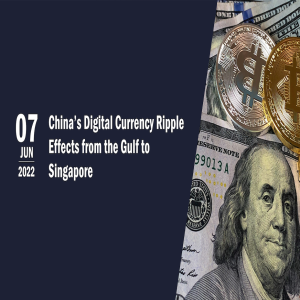
Monday Jun 13, 2022
China’s Digital Currency Ripple Effects from the Gulf to Singapore
Monday Jun 13, 2022
Monday Jun 13, 2022
China is at the forefront of the application of digital technologies in the financial sector – in securing benefits, regulating risks and in experimentation. Private companies Alibaba and Tencent spearheaded the introduction of e-payments within China but are now subject to increasing regulation. At the same time, Beijing has moved to clamp down on cryptocurrencies such as bitcoin mining and trading for reasons of financial stability, control and energy consumption.
In parallel, China has piloted the introduction of its own Central Bank Digital Currency (CBDC), known as the e-RMB, e-CNY or DC/EP (digital currency/electronic payment). This is a pilot that had 261 million individual participants as of January 2022. The main focus for the e-yuan is domestic, and serves as a component of China’s society-wide digital transformation.
However, the e-CNY is also, in the words of the People’s Bank of China, ‘ready for cross-border use’. China has already launched m-CBDC Bridge, a project on cross-border digital currency payment with the United Arab Emirates (UAE), Hong Kong and Thailand. The Monetary Authority of Singapore (MAS) estimates that using the e-CNY between Singapore and China could bring savings of 3-5% of Singapore’s gross domestic product. The MAS is assessing the economic case for a retail CBDC in Singapore and its potential implications for financial stability and monetary policy.
Worldwide, 90 countries are exploring their own digital currencies including the UAE and Kingdom of Saudi Arabia. There are ambitious plans to accelerate fintech transformation across the Gulf.
At the same time, Fed Chairman Jerome Powell has stated that he does not believe that China’s early adoption of a digital currency threatens the dollar’s role as the main global reserve currency. The UK’s House of Lords has concluded that CBDCs may be ‘a solution in search of a problem’ and are fraught with risks.
In this seminar, three experts will explore the potential economic and geopolitical impact of China’s initiatives in digital finance and the opportunities, risks and choices for countries in the Middle East. The seminar will address questions, including:
- Who benefits from the greater use of digital currencies and what are the risks?
- Will the e-CNY re-energise the internationalisation of the renminbi?
- Does it matter if the e-US dollar and e-Euro only come into being in 10 years’ time?
- Do China’s controls on cryptocurrencies matter for the rest of the world?
- Does every country need its own digital currency and why?
- What role will digital currencies play in Islamic finance and its institutions?
This public talk was conducted online via Zoom on Tuesday, 7 June 2022, from 5.00 pm to 6.30 pm (SGT). For more information, click here.
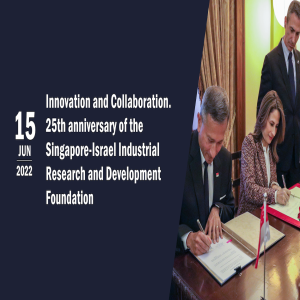
Thursday Jun 16, 2022
Thursday Jun 16, 2022
2022 marks the 25th anniversary of the Singapore-Israel Industrial Research and Development Foundation which has funded about 190 projects since its inception. The active collaboration between the two innovative countries has continued to strengthen over the past five decades. Earlier in March, Israel and Singapore signed a Memorandum of Understanding on cross-border cooperation on artificial intelligence. Singapore will also be establishing its embassy in Tel Aviv this year.
This webinar was organised by the Middle East Institute (NUS) to commemorate these significant events and the collaboration between both countries.
This public talk was conducted online via Zoom on Wednesday, 15 June 2022, from 4.00 pm to 5.30 pm (SGT). For more information, please click here: https://mei.nus.edu.sg/event/innovation-and-collaboration-25th-anniversary-of-the-singapore-israel-industrial-research-and-development/
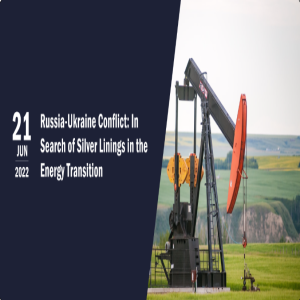
Wednesday Jun 22, 2022
Russia-Ukraine Conflict: In Search of Silver Linings in the Energy Transition
Wednesday Jun 22, 2022
Wednesday Jun 22, 2022
The war in Ukraine has forced Europe to re-examine its security strategy and energy dependence on Russian oil and gas. The EU is now pushing for an embargo on all Russian hydrocarbons – a previously unthinkable option. Whilst the energy industry has been rapidly shifting away from hydrocarbon investments, governments have been slow to promote low carbon alternatives, leaving a looming energy shortfall. But it is not just Europe, and energy, that will be affected.
Around the world, countries are bracing for the impact. Expectations of a post-Covid recovery have vanished – the IMF has predicted that global growth will halve from 2021’s 6.1 per cent. The war will add fuel to the inflation fire, and fears of a food crisis are looming. In Singapore, Prime Minister Lee Hsien Loong warned in his May Day address that a recession could hit within the next two years.
Geopolitically, too, countries will count the cost. The renewed alignment between the US and Europe to isolate Russia is forcing many countries follow suit. Nations such as Finland and Sweden are making plans to join NATO. While a majority of United Nations member states have backed a resolution condemning Russia’s invasion of Ukraine, many African and Asian states abstained or did not vote, not wishing to choose sides. Middle Eastern oil producers have resisted calls from the US to increase output. China, facing economic tailwinds of its own, is assessing how to avoid suffering Russia’s fate in future.
What will the various impacts of the war be? What is the outlook for Singapore and other countries in Asia? Will the climate emergency return to the headlines? What lenses should we put on to discern the main driving forces from the noise? Join us for this talk and question-and-answer session to find out.
This public talk was conducted online via Zoom on Tuesday, 21 June 2022, from 11.00 am to 12.00 pm (SGT).
Note: Mr Rose spoke in private capacity, and his views are his own.
For more information about this event, click here: https://mei.nus.edu.sg/event/russia-ukraine-conflict-in-search-of-silver-linings-in-the-energy-transition/
![[Boots Off The Ground] Episode 27: Security in Transition in the Middle East and Beyond] Chinese PSC High Tech Sector in Complex Environments](https://pbcdn1.podbean.com/imglogo/ep-logo/pbblog4563756/BOTG-LOGO-72-ppi-1024x576_300x300.jpg)
Wednesday Jun 29, 2022
Wednesday Jun 29, 2022
In this episode, Meia Nouwens discusses Chinese private security companies and artificial intelligence.
This podcast series is presented by Dr Alessandro Arduino, Principal Research Fellow at the Middle East Institute, National University of Singapore.

